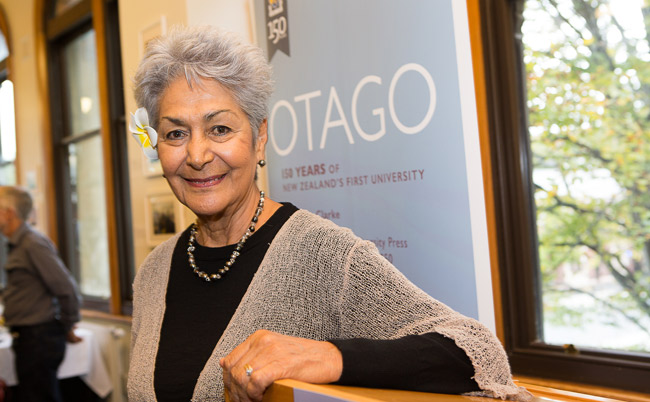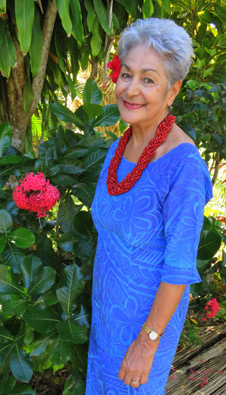Monday 15 April 2019 9:50pm

Papali’i Dr Viopapa Annandale-Atherton - the University's first female medical graduate from the Pacific at the Staff Club during a recent visit to Dunedin for the Pacific 150th anniversary weekend. Photo: Sharron Bennett.
Working across cultures and around the globe, Papali’i Dr Viopapa Annandale-Atherton has quietly forged a distinguished career in public health and as an advocate for women’s rights, helping pave the way for generations of Pacific Island medical students.
Viopapa was New Zealand’s first female medical graduate from the Pacific, and was one of many alumni from around New Zealand and the Pacific to visit Dunedin in March for the Pacific 150th anniversary weekend.
After graduating in May 1964, she worked as a house surgeon at the Royal Infirmary in Edinburgh - under the watchful gaze of her great-grandfather Thomas Annandale, Professor of Clinical Surgery. She went on to gain her Diploma in Tropical Public Health with Distinction at the London School of Hygiene, and spent five years on the World Health Organisation’s advisory committee on long-acting contraceptives.
"But as a female scholarship student girls were offered only two choices – you could be a nurse or a teacher. My mother decided I should aim to be a doctor."
In Samoa she set up a Maternal and Child Health and Family Planning Programme, held the post of Director of Public Health and worked in general practice.
Throughout her career, she has also been actively involved with women’s and children’s issues and was International President of the PAN Pacific and South East Asian Women’s Association for six years.
But back in the 1950s, when she first applied to study medicine as a Pacific scholarship student, her chances of achieving such a career looked bleak, and it was her own rights she and her parents had to fight for.
The scholarships were offered to Samoan students by the New Zealand government after Western Samoa achieved independence in 1962, to help Samoan citizens fill the positions that had previously been occupied by New Zealanders.
She first received a scholarship to attend Epsom Girls Grammar School in Auckland and then applied for one to go to university.
“But as a female scholarship student girls were offered only two choices – you could be a nurse or a teacher. My mother decided I should aim to be a doctor. When I applied they said ‘no you can’t, this is not possible, we’re not going to offer girls a scholarship to study medicine’.

Dr Viopapa Annandale-Atherton at home in Samoa.
“So began the struggle. Eventually they said they’d pay half and my parents could pay half. In the end my parents were never asked to pay for anything.”
With the scholarship however came the responsibility to show that she – and therefore other Pacific Island female students in the future – were “worth the investment”.
“The challenge was that I had to try and prove that a girl from the Pacific Islands could become a doctor.”
While at Otago, Viopapa was one of only 10 females in a class of about 100. She lived in St Margaret’s College for two years then went flatting with friends in Clyde Street and Māori Hill.
“I have so many memories of my time as a student. I absolutely adored it.”
In her last year she chose to go to Auckland and says she enjoyed herself perhaps a little too much that year, needing to return to Dunedin to resit an exam.
Her lecturers were very friendly and helpful, notably Professor Tom O’Donnell who, after she failed the exam in her final year, said, “Vio we’ve got to get you through, you’re going to Edinburgh, you’re going to Scotland”.
“I said OK! He was great, he really helped me get through that last hurdle.”
Her family story, like her career, is a global one. Her grandfather, the son of Professor Thomas Annandale, travelled to Samoa from Scotland looking for gold, and while there he met her grandmother.
After qualifying, Viopapa did make it to Edinburgh, working as a house surgeon at the Royal Infirmary, and finding herself eye-to-eye with her great-grandfather.
“When I arrived I worked in the same wards as he had, and there was a picture of him on the wall, looking down on me. It was quite an experience.”
"When I arrived I worked in the same wards as he had, and there was a picture of him on the wall, looking down on me. It was quite an experience."
On her mother Sina’s side, Viopapa’s grandfather was half Swedish and half Samoan, and was one of the major leaders in the movement fighting for independence. He was exiled from Samoa twice by the New Zealand government.
She says Samoa gaining independence in 1962 was “quite a moment for me”.
“I was 21 years old, raising the flag. It was profound because Samoan history is steeped with struggle, successes and deep tragedy. Many of us have family members who experienced all of that in our struggle to gain our independence.”
During her time at the Edinburgh Infirmary she met her husband, surgeon Dr John Atherton, and the couple and their two sons Malvern and James travelled back and forth between Samoa and the UK for a number of years.
She was asked by the Samoan government to set up a Maternal and Child Health and Family Planning programme and John for a time was Chief Surgeon at Motootua Hospital.
The couple returned permanently to Samoa in 1993, where they set up a general medical practice until she retired in 2012.
“I felt the need to give back to my country the opportunities it gave me as a scholarship student.”
Alongside her career in medicine, Viopapa has been an advocate for women’s and children’s rights and worked with a number of non-governmental organisations to eliminate discrimination against women.
As Samoan and International President of the PAN Pacific and South East Asian Women’s Association she pursued gender equality issues, particularly in minority groups, and “especially concerning women from the Islands, where I suppose the expectations are lower than you might have for women in New Zealand or Australia”.
She believes Samoa is slowly recognising the contribution women make to society.
“Women have always been valued, but in Samoan culture it is only within the family, in a wider sphere always men have taken precedence. But I think now gradually more and more women are gaining positions of influence.”
Viopapa says she’s “always been a bit of an activist”.
"I don’t really like to think I have achieved anything special. But I do hope by having done what I did it has opened up doors for others."
“When the French were testing their bombs in Tahiti, when I was at home we really protested.”
Today, she is concerned about the rise of non-communicable diseases in Samoa, particularly obesity.
“When I first went to England people said ‘your people must be very healthy, how many people die of heart attacks or high blood pressure in Samoa?’ and I said not very many, but it’s certainly changed, it has become a major issue for Pacific Islanders, also for Australia and New Zealand, it’s a universal problem.”
Mental health is another area of concern, and she continues to work with the Goshen Trust Samoa Mental Health Services.
“It is still a taboo subject in many ways, people don’t want to talk about it. And the suicide level among young people is very high. We have an active Suicide Awareness Society in Samoa working towards addressing contributing factors and offering advice and counselling.”
She is also involved with the Samoan Cancer Society and disaster relief organisation ADRA.
“I don’t really like to think I have achieved anything special,” she says. “But I do hope by having done what I did it has opened up doors for others.”
